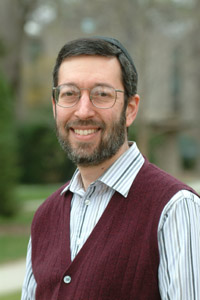PROFESSOR OF COMPUTER SCIENCE LECTURES AT PRESTIGIOUS MATHEMATICAL INSTITUTE

Details
Because the prestigious Isaac Newton Institute for Mathematical Sciences in Cambridge, England, attracts internationally renowned scientists to its math and science workshops, the administrators take pains to accommodate their guests physically and intellectually—sometimes in unexpected ways, as Associate Professor of Computer Science Steven Lindell discovered when he gave a presentation during the week of Feb. 27-March 3.
“There's a six-foot chalkboard in every room,” reports Lindell with amusement,“even in the men's room!”
Lindell's trip to the Institute was his first visit.“The whole concept is inspiring,” he says.“The United Kingdom wants to have all of these world-famous mathematicians and scientists in one place, and will pay for their accommodations. It's admirable.” He had a personal connection as well: A former University of Pennsylvania doctoral student Lindell once supervised is now a professor at affiliated Cambridge University, and led the workshop on logic and databases for which Lindell gave his lecture.
The topic of his talk related to his long-standing interest in the connections between mathematical logic and the complexity of computations and algorithms. He is intrigued by the logical foundations of thought:“I discovered in college that the best way to pursue this was not through biology, but math.” Later, he gravitated toward computer science because he wanted to understand the mathematical principles behind computer reasoning. More recently, he has tried to incorporate the influence of physical principles, which was the subject matter of his lecture.
Lindell discussed the matter requirements of computation, mentioning logic's important contributions to databases throughout the years.“There are some tasks that computers perform very well, such as record-keeping and processing social security,” he says.“They're successful because their systems use the theoretical foundation of mathematical logic.” He indicated that there are "natural" physical considerations of the arrangement of matter in space:“It necessitates a certain symmetric arrangement of information.”
Lindell's passion for logical thought also surfaces in his Haverford classroom, where he tries to convey to his students the mental processes involved in solving difficult problems.“If I solve a problem ahead of time,” he says,“the students only see the final result, not what I went through to get there.” He prefers to tackle equations in front of the class, narrating his steps.
Lindell will return to the Isaac Newton Institute in June to follow up on his previous lecture, this time focusing on the way energy is uniformly distributed in computers.“Heat is the limiting factor that prevents computers from going much faster than they already do, using the current technology,” he says.“My calculations predict that with continued advancements in technology, such as the switch to optical computing, computers should reach their final physical limits in 25 years, at which point they will be 100,000 times faster than they are today.”
In his next Institute talk, he will address the mathematical implications of energy constrained computation.“At some point it will be impossible for technology to go any further,” he says,“because of the laws of physics, such as conservation of energy.” Both his previous and upcoming lectures will be available at the Isaac Newton Institute's Web site and Lindell's home page.
Lindell is as devoted to educational innovations as he is to technological breakthroughs, and this summer he will continue his ongoing experiment in cooperative learning techniques that bring students together in small groups to solve problems.“It's been said that we learn best when we're engaged in a social setting such as a study group,” he says,“and remember things better when we are actively involved in a project.” Through Haverford's Cascade Mentoring Program, Lindell will collaborate with a local high school teacher, high school students, and a Haverford undergraduate, all of whom will work together on interactive tablet PCs that will allow them to observe and comment on each other's progress.
On a personal note, Lindell is also actively researching assistive computer technologies for users with physical disabilities such as himself; his arms have never fully recovered from a computer overuse injury 10 years ago. He performs all of his computer-oriented tasks with the help of voice recognition software, on which he recently gave a presentation for the Office of Disability Services.“Presently,” he says,“I can't dictate mathematics, so the College pays my wife, Suzanne, to type for me.” He hopes someday for the development of a software program that will automatically recognize mathematical equations.
— Brenna McBride



